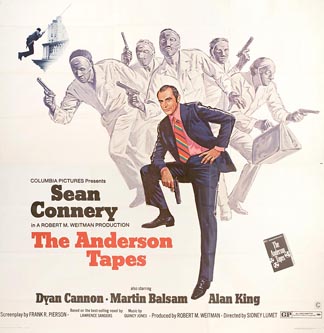
THE ANDERSON TAPES
US, 1971, 99 minutes, Colour.
Sean Connery, Dyan Cannon, Martin Balsam, Ralph Meeker, Alan King.
Directed by Sidney Lumet.
The Anderson Tapes is a thriller directed by Sidney Lumet in 1971, at a time when his films were not so popular. He had been popular in the 60s and came to prominence in the mid-70s with Serpico, Dog Day Afternoon, Network and Murder on the Orient Express. The ideas in this thriller are interesting: a robbery (quite ingenious) masterminded by Anderson (Sean Connery), who had spent ten years in prison. The world he re-enters is the world of bugging, tapes, cameras, closed circuit television, the perpetual invasion of privacy. More could have come from all these ingredients. Photography and editing are slick, acting is clever, music effective. Though quite popular, the film might have been better considering the approach that Lumet has taken to so many of his films.
1. The particular qualities of this thriller, robbery, social comment? The reputation of Sidney Lumet as a director?
2. The conventions of the crime genre: the man released from prison taking up an old way of life, the various criminal types, the action sequences, the background of robberies,, the excitement?
3. The importance of the title, the emphasis on electronics and surveillance? How well was this visualised? The details of the tape, the playing back of the tapes, the invasions of privacy? The questions of privacy and the individual's right? Surveillance for protection? Surveillance and the law and the abuses of invading privacy? The judgment on modern surveillance and electronics?
4. Comment on the reasons given for the taping of each person: Duke and his plans, Ingrid and her way of life, Askins' because of his being a fence for stolen goods, the Kid because of his narcotics connections. Spencer and political black panthers? Were there any rights for these buggings? Comment on the T.V. guards and their protection of the apartment building. The irony of the discovery via the boy's radio?
5. Duke as the old style American criminal trying to succeed in a more modern world? The effects of prison, his strength of character. determination? His confronting a world he did not know? The importance of the relationship with Ingrid? His rounding up his gang, his ID1d and authority over everyone? His dependence on the Mafia? His use of Askins to plan the robbery? The details of the plans and yet its going wrong? How much sympathy for Duke as a character?
6. Askins as a character. his job, his ability to case the valuables in the apartments? The film’s comment on him as a character? The homosexuality issue?
7. The varying personalities of the gang, their strengths of character, associations, interaction? The Kid, Spencer, Socks and his being imposed on by the Mafia?
8. The presentation of the Mafia, the contrast with wealth, suave power, deals rather than crime and burglary?
9. The detailed build-up of the plan, the details of its execution and the film's attention to this? The day, the irony of people at home,. the irony of the boy with the radio set?
10. The confrontation with the law? The police, especially Captain Delany? The options of giving up or being killed? The way the men died?
11. The final irony and judgment with the destruction of the tapes?
12. How well can a crime thriller entertain and give an explanation of crime, the skill of criminals. society. politics, good and evil, surveillance?